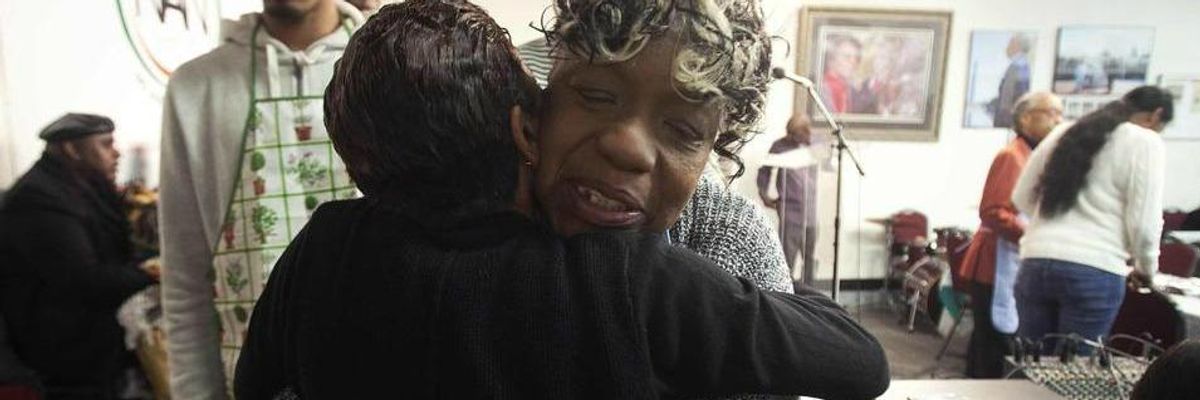The deaths of Eric Garner, Michael Brown, and others at the hands of police demonstrate that the "broken windows'' theory of policing doesn't work and should be eliminated. The theory that targeting low-level crimes will reduce major ones has led to the deaths of unarmed blacks by police over petty crime, mistaken identity, toy guns, bungled raids, and rash judgments based on stereotypes.
Even the criminologists who introduced the theory knew that broken windows could break innocent black lives. "How do we ensure, in short, that the police do not become the agents of neighborhood bigotry?" James Q. Wilson and George Kelling asked in their seminal 1982 Atlantic article. "We can offer no wholly satisfactory answer to this important question. "
Still, broken windows was born, adopted most notably by New York Mayor Rudolph Giuliani and his police commissioner, William Bratton. Violent crime did drop in New York, but it also dropped nationwide, under many different policing styles. A 2004 National Academy of Sciences report said that "research does not provide strong support" for broken windows. More likely reasons for the crime rate drop were the ebb of the 1980s crack epidemic, population shifts, intense policing of specific serious problems, and community policing that best promoted, according to the academy, "direct involvement of police and citizens."
Worse, broken windows morphed into something more insidious. In a 2004 study, Harvard and Michigan researchers found that perceptions of "disorder" had less to do with decrepit physical surroundings than if black people dominated the street scene. Such findings reconfirmed the continuing intensity of stereotypes about the "dangerousness of blacks."
Because of that perceived dangerousness, black people themselves became the broken windows, joined in recent years by Latinos. The result was a tsunami that swept untold people of color off the streets. Between 1980 and today, America's prison population exploded five-fold, to 1.5 million. Broken windows coincided with harsh drug policies that put away untold nonviolent offenders for long mandatory sentences. Even though there are no major differences by race in illegal drug use, African-Americans, 13 percent of the nation's population, have made up more than a third of state drug and public order imprisonments and account for more than a third of federal inmates.
In recent years, financially strapped states have begun to curb the warehousing of nonviolent drug offenders, and Congress has reduced sentencing disparities that disproportionately punish African-Americans.
But the broken windows theory is still used in police departments across the country, resulting in racial profiling and unleashing other indiscriminate policies on black people, such as stop-and-frisk, that are never similarly applied in white neighborhoods. The failure of broken windows to do anything except discriminate is a constant theme running through investigations of police departments by the Justice Department under President Obama.
It found major patterns of excessive force in Cleveland, Albuquerque, Seattle, and Miami and harsh treatment of Latinos in traffic stops in Maricopa County, Ariz. and East Haven, Conn.
It found discriminatory stops of pedestrians and drivers of color in Newark, N.J., and Antelope Valley, Calif., and discriminatory policing of people of color, gay citizens, and women trying to report domestic violence in New Orleans.
The Justice Department's findings in Maricopa sum up how so much injustice starts with an assumption that the person him or herself is the broken window. The government said many unjustified stops and detentions occurred after police received "bias-infected" reports complaining not of criminal activity, but of "individuals with 'dark skin' congregating in one area, or individuals speaking Spanish at a local business."
Broken windows continues to be unapologetically defended by its originators, despite Eric Garner's police-choking death over loose, untaxed cigarettes. Wilson died in 2012, but Kelling and Bratton, once again New York's police commissioner, claimed in a recent Wall Street Journal column: "The majority of New Yorkers, including minorities, approve of police addressing disorderly illegal behavior, such as public drinking and drug use, fights, public urination, and other acts considered to be minor offenses." Giuliani incredibly boasted on FOX News that he and his successor, Michael Bloomberg, "saved more black lives than any mayors in the history of the city."
The protests over the killing of Garner for a minor offense, and similar police killings in other cities, suggest that Giuliani and proponents of broken windows are hardly saviors. Few people want petty criminals ruling the corners, but neither do they want them executed. Broken windows made for a good mantra, but it is malevolent policy. It is a disaster because being black became the primary offense.
